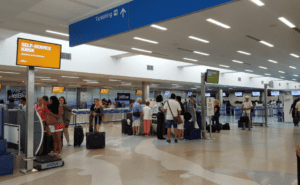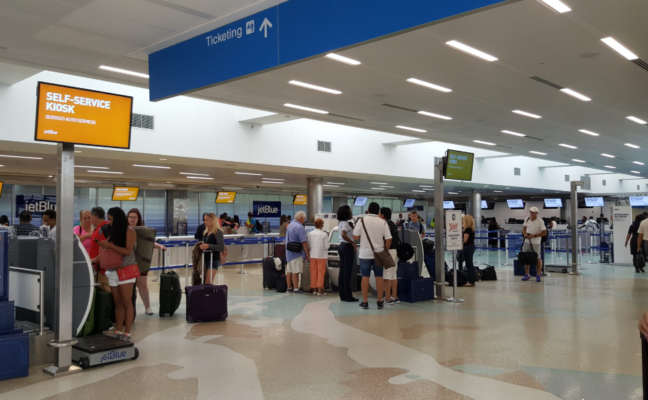Fort Lauderdale-Hollywood International Airport: A Floridian Gateway to Unforgettable Journeys

Fort Lauderdale-Hollywood International Airport: A Floridian Gateway to Unforgettable Journeys
Nestled on the southeastern coast of Florida, Fort Lauderdale-Hollywood International Airport (FLL) is not merely an intersection of runways and terminals but a vibrant portal to the quintessential Sunshine State experience. It weaves together a rich tapestry of history, cutting-edge facilities, and a commitment to sustainability, providing travelers with a seamless transition from the bustling airport terminals to the sun-kissed landscapes and cultural delights that define Florida. In this exploration of FLL, we embark on a journey through its historical roots, modern amenities, community engagement, and the challenges and triumphs that characterize this Floridian aviation hub.
Historical Roots and Growth:
The story of Fort Lauderdale Airport is one of evolution, adapting to the changing dynamics of air travel while staying rooted in its historical significance. From its humble beginnings as a military airfield during World War II, the airport transformed into a bustling commercial hub, officially opening its doors as the Broward County International Airport in 1953. Over the years, it metamorphosed to keep pace with the burgeoning demand for air travel, undergoing expansions and renovations to cater to the needs of a growing region.
In a nod to its dual allegiance to both Fort Lauderdale and Hollywood, the airport assumed its current moniker – Fort Lauderdale-Hollywood International Airport – in 1981. Today, FLL stands as a testament to progress, seamlessly blending the nostalgia of its origins with the demands of modern aviation.
Terminals and Facilities at Fort Lauderdale-Hollywood International Airport:
Spread across four terminals, FLL beckons travelers into a world where convenience meets comfort. Each terminal is designed not just as a waypoint but as a curated space, offering a variety of amenities and services to enhance the traveler’s journey.
Terminal 1 (New Terminal): This modern facility, known as the New Terminal, is a testament to architectural innovation. Serving Southwest Airlines and select international carriers, it welcomes passengers with spacious check-in areas and a palette of dining and shopping options that reflect the spirit of contemporary travel.
Terminal 2: Playing host to Delta Air Lines and Air Canada, Terminal 2 is a bustling hub of domestic and international flights. Travelers navigating its corridors encounter a fusion of amenities, from dining establishments to retail outlets, creating a dynamic atmosphere within its confines.
Terminal 3: As the primary terminal, Terminal 3 stands at the heart of FLL. Servicing a diverse range of airlines, including JetBlue Airways, it offers an array of services and facilities. From duty-free shops to restaurants, the terminal invites travelers to immerse themselves in a vibrant pre-flight experience.
Terminal 4: Dedicated primarily to Spirit Airlines, Terminal 4 is a gateway for budget-conscious travelers. Despite its focus on affordability, the terminal doesn’t compromise on services, offering lounges, retail outlets, and dining choices to ensure a comfortable sojourn.
Amenities and Services:
FLL prides itself on offering a comprehensive suite of amenities, ensuring that each traveler’s passage through the airport is more than a mere logistical exercise – it’s an experience.
Parking: FLL’s parking options cater to the diverse needs of travelers, providing both short-term and long-term solutions. On-site parking garages, strategically located for easy access to terminals, coexist with off-site alternatives, offering a range of choices to suit different preferences and budgets.
Ground Transportation: The airport’s commitment to convenience extends beyond its terminals to ground transportation. Travelers can seamlessly transition from air to land with rental car services, shuttles, taxis, and rideshare options. FLL’s strategic location ensures that major highways are easily accessible, facilitating exploration beyond the airport’s borders.
Lounges: Recognizing the importance of pre-flight relaxation, FLL hosts various lounges across its terminals. These oases provide more than just comfortable seating; they offer a refuge for travelers to enjoy complimentary refreshments and access business facilities, creating a serene environment before takeoff.
Dining and Shopping: FLL takes pride in curating a diverse culinary and retail landscape. From casual dining options to gourmet experiences, travelers can embark on a culinary journey reflective of Florida’s eclectic palate. The airport’s terminals house an array of shops, allowing passengers to indulge in retail therapy, purchasing everything from travel essentials to curated souvenirs.
Art and Cultural Exhibits: Fort Lauderdale Airport transcends the functional by integrating art and culture into its spaces. Rotating exhibits and installations dot the terminals, providing travelers with opportunities for visual and interactive engagement. FLL becomes not just a transit point but a canvas for cultural exploration.
Wi-Fi and Charging Stations: FLL recognizes the indispensable role of connectivity in the modern travel experience. Complimentary Wi-Fi blankets the terminals, ensuring that travelers stay connected. Conveniently located charging stations further contribute to the traveler’s ability to keep devices powered, bridging the digital gap while awaiting departure.
Connecting to the Community:
Fort Lauderdale Airport is more than an architectural marvel and logistical hub; it is an integral part of the local community, contributing to economic development, cultural enrichment, and environmental responsibility.
Job Creation: Serving as a major employer in Broward County, FLL generates a plethora of job opportunities. From airline and airport staff to roles in retail and hospitality, the airport’s growth ripples through the local job market, bolstering economic resilience.
Community Partnerships: FLL actively forges partnerships with local organizations and businesses. These collaborations extend to cultural institutions, educational initiatives, and endeavors that promote sustainability. The airport becomes a catalyst for community growth and cooperation.
Cultural Programs: Beyond the confines of its terminals, Fort Lauderdale Airport becomes a canvas for cultural expression. The airport’s commitment to showcasing local talent and reflecting the region’s cultural diversity ensures that travelers experience the vibrant arts scene of Fort Lauderdale, even if just in passing.
Sustainability Initiatives:
In an era where sustainability is paramount, FLL has embraced initiatives aimed at reducing its environmental footprint and fostering a commitment to eco-friendly practices.
Green Building Practices: FLL incorporates green building practices into its infrastructure projects. Energy efficiency, water conservation, and the use of sustainable materials form the bedrock of these initiatives, ensuring that the airport meets or exceeds industry standards for environmental responsibility.
Waste Reduction and Recycling: FLL actively engages in waste reduction and recycling efforts. Strategically placed recycling bins throughout the terminals encourage travelers to participate in the airport’s sustainability initiatives, minimizing the environmental impact of waste.
Energy Conservation: The airport invests in energy-efficient technologies to decrease overall energy consumption. From energy-efficient lighting to HVAC systems, FLL aims to be a responsible steward of resources, reducing its carbon footprint and contributing to the broader conversation on energy conservation.
Community Engagement: FLL extends its commitment to sustainability to the local community. Collaborations with organizations focused on conservation and environmental education highlight the airport’s dedication to fostering awareness and shared responsibility for the region’s natural resources.
Challenges and Future Developments:
While FLL has celebrated successes, it grapples with challenges inherent in the aviation industry’s ever-evolving landscape.
Capacity and Congestion: Managing increased passenger traffic while maintaining operational efficiency is an ongoing challenge for FLL. Striking the right balance between expansion efforts and preventing congestion and delays remains a priority.
Infrastructure Investment: The airport must continually invest in infrastructure to meet the evolving needs of air travel. Upgrades to runways, terminals, and other critical facilities are essential to ensure a seamless passenger experience and uphold FLL’s reputation as a modern aviation hub.
Technology Integration: Staying at the forefront of technological advancements is crucial for FLL to remain competitive and enhance passenger satisfaction. Integrating cutting-edge technologies for security, check-in processes, and communication will be pivotal for the airport’s future success.
Environmental Sustainability: Balancing growth with environmental responsibility is an ongoing challenge. FLL will need to persist in its efforts to reduce carbon emissions, minimize water consumption, and further decrease waste production to ensure long-term sustainability.
Read about : Clash of Titans: A Deep Dive into the 49ers vs. Cardinals Rivalry
The Future of Fort Lauderdale Airport:
As FLL charts its course into the future, ambitious plans for expansion, technological integration, and sustainability initiatives lay the groundwork for continued success. The airport envisions a future where it not only connects travelers to destinations but sets new benchmarks for excellence in air travel.
Fort Lauderdale-Hollywood International Airport transcends its role as a mere transit point. It embodies the spirit of Florida, where history meets innovation, and where the warmth of community engagement is as palpable as the sunshine that bathes its runways. FLL is a testament to the evolution of air travel, from its modest beginnings to a state-of-the-art facility that seamlessly integrates the practicalities of modern travel with the cultural richness of its surroundings.
Whether travelers are passing through its terminals for business or leisure, Fort Lauderdale Airport invites them to not just journey through space but through an experience that encapsulates the essence of the Sunshine State. As FLL continues to evolve, it remains poised at the intersection of progress, community, and sustainability, inviting each passenger to embark on a journey that extends beyond the runway – a journey into the heart of the vibrant and welcoming Floridian landscape.




